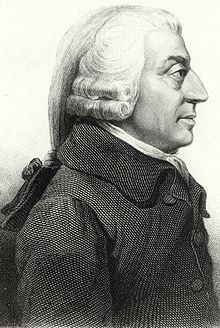Portal:Libertarianism
Libertarianism Portal
Selected article
The Austrian School is a heterodox school of economic thought that emphasizes the spontaneous organizing power of the price mechanism. Its name derives from the identity of its founders and early supporters, who were citizens of the old Austrian Habsburg Empire, including Carl Menger, Eugen von Böhm-Bawerk, Ludwig von Mises, and Nobel laureate Friedrich Hayek. Currently, adherents of the Austrian School can come from any part of the world, but they are often referred to simply as Austrian economists and their work as Austrian economics.
The Austrian School was influential in the late 19th and early 20th century. Austrian contributions to mainstream economic thought include involvement in the development of the neoclassical theory of value and the subjective theory of value on which it is based, as well as contributions to the "economic calculation debate" which concerns the allocative properties of a centrally planned economy versus a decentralized free market economy. From the middle of the 20th century onwards, it has been considered outside the mainstream, with notable criticisms related to the School leveled by economists such as Bryan Caplan, Jeffrey Sachs, and Nobel laureates Paul Samuelson, Milton Friedman, and Paul Krugman. Followers of the Austrian School are now most frequently associated with libertarian political perspectives that emanate from such bodies as the Ludwig von Mises Institute and George Mason University in the US.
Austrian School principles advocate strict adherence to methodological individualism – analyzing human action exclusively from the perspective of an individual agent. Austrian economists also argue that mathematical models and statistics are an unreliable means of analyzing and testing economic theory, and advocate deriving economic theory logically from basic principles of human action, a method they term 'praxeology'. Additionally, whereas experimental research and natural experiments are often used in mainstream economics, Austrian economists contend that testability in economics is virtually impossible since it relies on human actors who cannot be placed in a lab setting without altering their would-be actions. Mainstream economists are generally critical of methodologies used by modern Austrian economists; in particular, a primary Austrian School method of deriving theories has been criticized by mainstream economists as a priori "non-empirical" analysis and differing from the practices of scientific theorizing, as widely conducted in economics.
Austrian School economists generally hold that the complexity of human behavior makes mathematical modeling of an evolving market extremely difficult (or undecidable) and advocate a laissez faire approach to the economy. They advocate the strict enforcement of voluntary contractual agreements between economic agents, and hold that commercial transactions should be subject to the smallest possible imposition of coercive forces. In particular, they argue for an extremely limited role for government and the smallest possible amount of government intervention in the economy.
Selected biography
Adam Smith (baptised 16 June 1723 – died 17 July 1790 [OS: 5 June 1723 – 17 July 1790]) was a Scottish social philosopher and a pioneer of political economy. One of the key figures of the Scottish Enlightenment, Smith is the author of The Theory of Moral Sentiments and An Inquiry into the Nature and Causes of the Wealth of Nations. The latter, usually abbreviated as The Wealth of Nations, is considered his magnum opus and the first modern work of economics. It earned him an enormous reputation and would become one of the most influential works on economics ever published. Smith is widely cited as the father of modern economics and capitalism.
Smith studied social philosophy at the University of Glasgow and the University of Oxford. After graduating, he delivered a successful series of public lectures at Edinburgh, leading him to collaborate with David Hume during the Scottish Enlightenment. Smith obtained a professorship at Glasgow teaching moral philosophy, and during this time he wrote and published The Theory of Moral Sentiments. In his later life, he took a tutoring position that allowed him to travel throughout Europe, where he met other intellectual leaders of his day. Smith returned home and spent the next ten years writing The Wealth of Nations, publishing it in 1776. He died in 1790.
References
Categories
Libertarianism topics
Related portals
Parent portals
Socio-political portals

